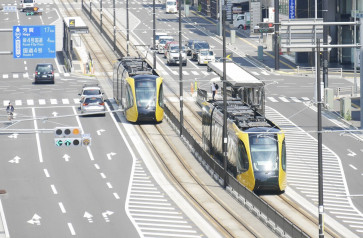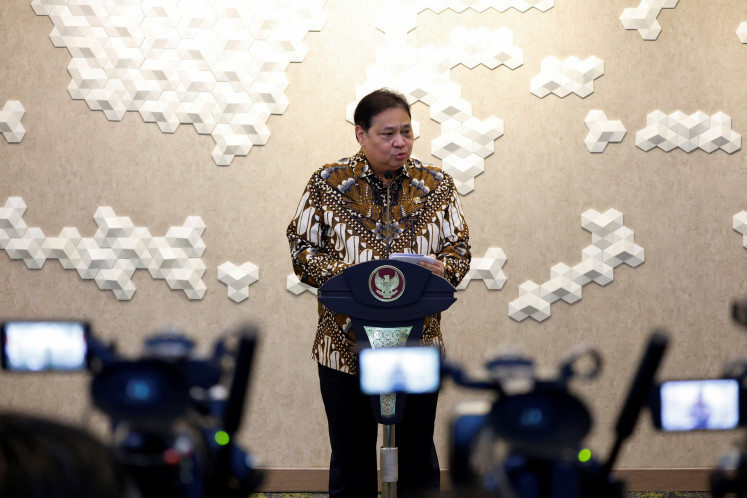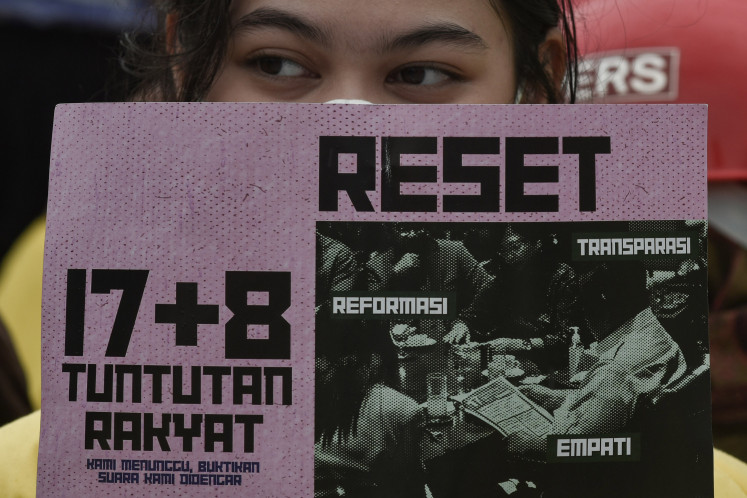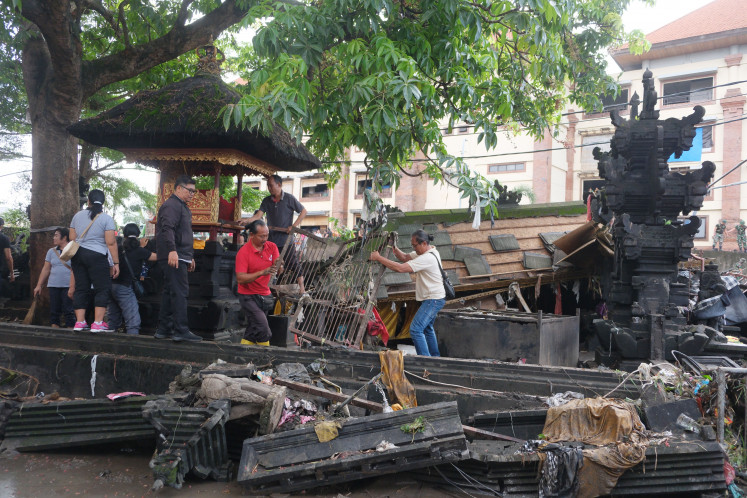Popular Reads
Top Results
Can't find what you're looking for?
View all search resultsPopular Reads
Top Results
Can't find what you're looking for?
View all search resultsWTO inks historic deal
The right stuff: World Trade Organization (WTO) director general Roberto Azevêdo (left) clasps the hand of Indonesian Trade Minister Gita Wirjawan at the closing ceremony in Nusa Dua, Bali, on Saturday
Change text size
Gift Premium Articles
to Anyone
 The right stuff: World Trade Organization (WTO) director general Roberto Azevêdo (left) clasps the hand of Indonesian Trade Minister Gita Wirjawan at the closing ceremony in Nusa Dua, Bali, on Saturday. (JP/Zul T. Edoardo) (WTO) director general Roberto Azevêdo (left) clasps the hand of Indonesian Trade Minister Gita Wirjawan at the closing ceremony in Nusa Dua, Bali, on Saturday. (JP/Zul T. Edoardo)
The right stuff: World Trade Organization (WTO) director general Roberto Azevêdo (left) clasps the hand of Indonesian Trade Minister Gita Wirjawan at the closing ceremony in Nusa Dua, Bali, on Saturday. (JP/Zul T. Edoardo) (WTO) director general Roberto Azevêdo (left) clasps the hand of Indonesian Trade Minister Gita Wirjawan at the closing ceremony in Nusa Dua, Bali, on Saturday. (JP/Zul T. Edoardo)
T
span class="caption" style="width: 498px;">The right stuff: World Trade Organization (WTO) director general Roberto Azevêdo (left) clasps the hand of Indonesian Trade Minister Gita Wirjawan at the closing ceremony in Nusa Dua, Bali, on Saturday. (JP/Zul T. Edoardo)
A week of tense, dramatic negotiations at the 9th World Trade Organization (WTO) Ministerial Meeting ended in smiles on Saturday, as the 160 members of the trade governing body pulled off a historic agreement.
After nearly two decades in existence, the WTO finally produced a global trade reform deal.
Working late into the night, delegates overcame a final holdout ' not India, but Cuba, which was backed by Bolivia, Venezuela and Nicaragua in its attempt to press the United States to lift its embargo on the island ' only a few hours before the closing ceremony in the morning.
'This week has been about high-level diplomacy, long nights and considerable drama,' said weary-eyed Indonesian Trade Minister Gita Wirjawan to the roaring and applauding delegates during the closing ceremony.
'But it has also been about ensuring that the gains of the multilateral trading system reach our small businesses and our most vulnerable economies ['¦] This is the place where deals get done. And I am delighted that Bali has not let us down.'
Gita's wife, Yasmin Stamboel Wirjawan, shed tears when he announced that a deal had been reached.
Tears also welled in the eyes of WTO director-general Roberto Azevêdo as he conveyed his gratitude to the host country, WTO members and his wife. 'I must thank,' he paused, trying to restrain his emotion, 'I must thank my wife [Maria Nazareth Farani Azevêdo].
'We have put the 'world' back in the World Trade Organization. We're back in business [...] Bali is just the beginning.'
Negotiations faced collapse over a firm stand on food security made by India, which finally agreed on three points: agricultural issues, trade facilitation and development and least-developed countries (LDCs).
India had previously insisted on linking an interim solution to a permanent one in agricultural issues and not backing down from public stockpiling to support its National Food Security Act, which was passed into law in September.
Just after a compromise with India was reached late Saturday, Cuba threw up another hurdle ' the US embargo of the island, which was a lingering issue from the latest talks for a draft text in Geneva last month.
To salvage a deal, the closing ceremony, scheduled for Friday afternoon, was postponed, with ministers working well into Saturday morning to find a consensus.
In the agreement on agricultural issues, for the time being, developing countries are permitted to maintain public food stockpiles for food security, without being challenged through the WTO Dispute Settlement Mechanism, until a permanent solution is found.
Regarding trade facilitation, each member shall improve its trade system to ensure a smooth flow of goods.
In the development and LDC package, developed and developing countries also shall seek to provide duty-free and quota-free market
access to at least 97 percent of products originating from LDCs.
The European Union, which along with the US had put pressure on India since the start of the meeting, welcomed the final wording.
'I think it's very good result. In fact, it's the first multilateral agreement since the inception of the WTO,' EU trade commissioner Karel De Gucht said after the ceremony.
Likewise, US trade representative Michael Froman said that, 'WTO members have demonstrated that we can come together as one to set new rules that create economic opportunity and prosperity for our nations and peoples.'
Centre for Strategic and International Studies (CSIS) economist Djisman Simanjuntak praised Gita and Indonesia for producing a deal ' something he had not expected to happen. He noted, however, public stockpiling by developing countries remained in a status quo until a permanent solution was established.
Meanwhile, University of Indonesia (UI) international trade expert Mahmud Syaltout said the trade facilitation agreement left Indonesia with 'lots of homework', requiring it to 'greatly adjust its legal products'.
Indonesian Farmers Union chairman Henry Saragih said the agreement on agriculture failed to lift numerous restrictions on developing countries running food security programs, as it still limited the amount of subsidies to a certain percentage.









